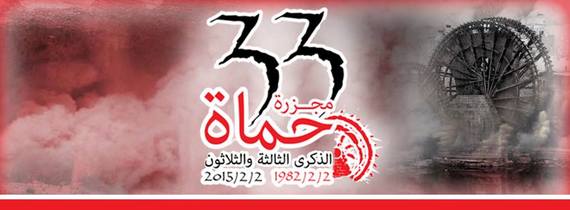On February 2, 1982, Syrian troops -- acting under the orders of then-President Hafez al-Assad and led by his brother, Rifaat al-Assad -- besieged the city of Hama in an effort to quell an anti-government uprising by the Muslim Brotherhood. By the 28th of that month, as many as 40,000 people had been killed, the majority of them unarmed civilians. For 27 days, artillery shells rained down on the city while soldiers, who had sworn an oath to protect their homeland (and its people), gunned down family after family in their homes and in city streets.
For decades to come, the Syrian people were effectively silenced. The massacre, referred to as al-Ahdath (the "events"), was discussed only in hushed tones and in utter privacy. In Hama, a hotel was built atop the ruins of al-Keilaneyeh neighborhood, which had been completely flattened, while half-destroyed houses remained untouched in some of the city's other neighborhoods, serving as a reminder of what would happen to those who dared speak out against the dictatorial regime.
It was not until the birth of the popular uprising against current President Bashar al-Assad in March 2011 that the Syrian people began to publicly talk about what had befallen Hama and mourn the thousands of lives lost. The phrase "Oh Hama, forgive us" became commonplace in revolutionary songs, as the people of Syria tried to come to terms with the fact that they had remained silent during and after the onslaught of the country's fourth-largest city so many years ago.
 A graphic design featuring Hama's landmark waterwheels and a blood-stained Orontes River marks the 33rd anniversary of the massacre.
A graphic design featuring Hama's landmark waterwheels and a blood-stained Orontes River marks the 33rd anniversary of the massacre.
The 30th anniversary of the Hama massacre in February 2012 was the first real opportunity for the city's people -- the children and grandchildren of the victims -- to mourn the destruction of their city and its people. On a Facebook page entitled "Commemorating the 30th Anniversary of the Hama Massacre," activists worked tirelessly to collect and disseminate the photos and biographies of the massacre's martyrs. Some of those activists, operating under pseudonyms, were able to, for the first time, publicly declare that their fathers had been killed by the Assad regime; for years, the government had offered certain benefits to families who signed documents stating that their loved ones were killed by the Muslim Brothers.
There was an outpour of stories of the massacre being shared online, a hidden truth becoming public knowledge for the very first time. In Riyadh, Syrians in exile hosted an event marking the 30th anniversary, remembering the city's martyrs, and screening a mini-documentary produced specifically for the event. Eventually, Al Jazeera Arabic produced a full-length historical documentary about the events of 1982. And in Hama itself, the photographers of the Young Hamwi Lens collective took to the city's streets, photographing the ruins in neighborhoods such as al-Bashoura and Souq al-Shajara.
When the Syrian revolution broke out nearly four years ago, the people were confident that Hama 1982 would not be repeated. Surely the power of social media and the ability to share with the world what was taking place in Syria would prevent Bashar from committing the same atrocities that his father had gotten away with! But alas, their optimism turned out to be sorely misplaced. On this 33rd anniversary, Homs and Aleppo and Douma and Ghouta and Darayya and Banias and Daraa and Deir Ezzor and countless towns and villages across Syria have been decimated, at least 200,000 people martyred, hundreds of thousands imprisoned and forcibly disappeared, and millions displaced. All on the world's watch.
I have not many words left to say about Syria. Words will not stop the bloodshed, feed the hungry, shelter the displaced, or liberate those perishing behind bars. They will not heal the emotional and physical trauma endured by so many over the last four years, and they most certainly will not rebuild entire cities or repair the social fabric that has been torn apart. But I could not allow this occasion to pass without memorializing it. To the martyrs of Hama and Syria as a whole, forgive us, and rest in peace.